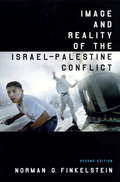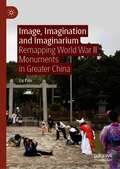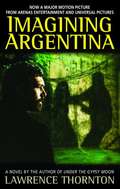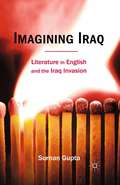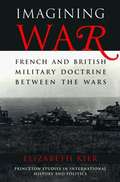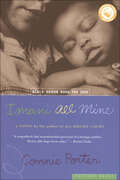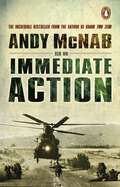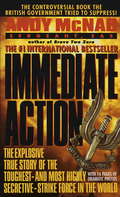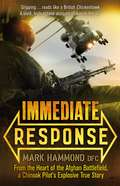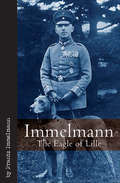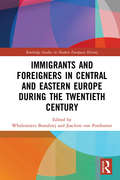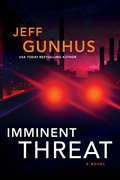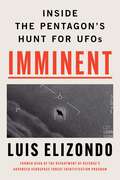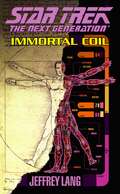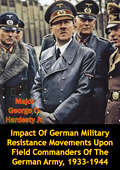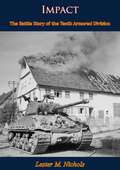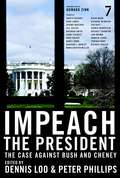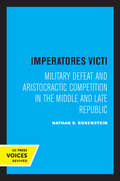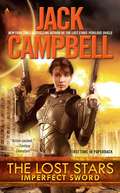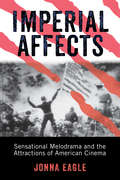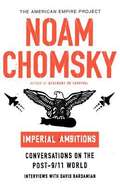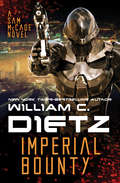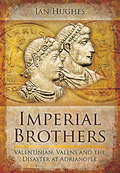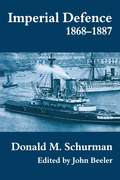- Table View
- List View
Image and Reality of the Israel-Palestine Conflict
by Norman FinkelsteinThis acclaimed study surveys the dominant popular and scholarly images of the Israel-Palestine conflict. Finkelstein opens with a theoretical discussion of Zionism, locating it as a romantic form of nationalism that assumed the bankruptcy of liberal democracy. He goes on to look at the demographic origins of the Palestinians, with particular reference to the work of Joan Peters, and develops critiques of the influential studies of both Benny Morris and Anita Shapira. Reviewing the diplomatic history with Aban Eban's oeuvre as his foil, Finkelstein closes by demonstrating that the casting of Israel as the innocent victim of Arab aggression in the June 1967 and October 1973 wars is not supported by the documentary record. This new edition critically reexamines dominant popular and scholarly images in the light of the current failures of the peace process.From the Trade Paperback edition.
Image, Imagination and Imaginarium: Remapping World War II Monuments in Greater China
by Lu PanThis book explores five cases of monument and public commemorative space related to World War II (WWII) in contemporary China (Mainland), Hong Kong and Taiwan, all of which were built either prior to or right after the end of the War and their physical existence still remains. Through the study on the monuments, the project illustrates past and ongoing controversies and contestations over Chinese nation, sovereignty, modernism and identity. Despite their historical affinities, the three societies in question, namely, Mainland China, Hong Kong and Taiwan, vary in their own ways of telling, remembering and forgetting WWII. These divergences are not only rooted in their different political circumstances and social experiences, but also in their current competitions, confrontations and integrations. This book will be of great interest to historians, sinologists and analysts of new Asian nationalism.
Images from the Arsenal of Democracy: Images From The Arsenal Of Democracy
by Charles K. HydeWhile researching his previous study, Arsenal of Democracy: The American Automobile Industry in World War II (Wayne State University Press, 2013), award-winning automotive historian Charles K. Hyde discovered the many remarkable photos that were part of the era's historical documentation. In Images from the Arsenal of Democracy, Hyde presents a selection of nearly three hundred of these documentary photos in striking black and white, with brief captions. Taken together, the images create a captivating portrait of this crucial moment in American business, military, and cultural history. Images from the Arsenal of Democracy spans from 1940 until the end of the war, presenting up-close, rarely seen views of newly built plants and repurposed production lines, a staggering variety of war products and components, and the many workers behind Detroit's wartime production miracles. The human faces that Hyde presents are especially compelling, as photos show the critical role played by previously underused workers--namely women and African Americans. Images from the Arsenal is divided into chapters by theme, including "Preparing for War before Pearl Harbor"; "Planning Defense Production after Pearl Harbor"; "Aircraft Engines and Propellers"; "Aircraft Components and Complete Aircraft"; "Tanks and Other Armored Vehicles"; "Jeeps, Trucks, and Amphibious Vehicles"; "Guns, Shells, Bullets, and Other War Goods"; "The New Workers"; and "Celebrating the Production Achievements." The first comprehensive and detailed history drawn solely from the surviving photographic record of wartime Detroit, Images from the Arsenal will be appreciated by automotive historians, World War II scholars, and American history buffs.
Imagining Argentina
by Lawrence ThorntonImagining Argentina is set in the dark days of the late 1970's, when thousands of Argentineans disappeared without a trace into prison cells and torture chambers. When Carlos Rueda's wife is suddenly taken from him, he discovers a magical gift: In waking dreams, he had clear visions of the fates of "the disappeared. " But he cannot "imagine" what has happened to his own wife. Driven to near madness, his mind cannot be taken away: imagination, stories, and the mystical secrets of the human spirit. Note: Inconsistent use of accents in original text.
Imagining Iraq
by Suman GuptaIn the run-up to, during and after the invasion of Iraq a large number of literary texts addressing that context were produced, circulated and viewed as taking a position for or against the invasion, or contributing political insights. This book provides an in-depth survey of such texts to examine what they reveal about the condition of literature.
Imagining War: French and British Military Doctrine between the Wars (Princeton Studies In International History And Politics Series #153)
by Elizabeth KierIn richly detailed case studies, Kier examines doctrinal developments in France and Great Britain during the interwar period. <P><P>She tests her cultural argument against the two most powerful alternative explanations and illustrates that neither the functional needs of military organizations nor the structural demands of the international system can explain doctrinal choice. She also reveals as a myth the argument that the lessons of World War I explain the defensive doctrines in World War II.
Imani All Mine: A Novel
by Connie Rose Porter"With authority and grace" (Essence), Imani All Mine tells the story of Tasha, a fourteen-year-old unwed mother of a baby girl. In her ghettoized world where poverty, racism, and danger are daily struggles, Tasha uses her savvy and humor to uncover the good hidden around her. The name she gives her daughter, Imani, is a sign of her determination and fundamental trust despite the odds against her: Imani means faith. Surrounding Tasha and Imani is a cast of memorable characters: Peanut, the boy Tasha likes, Eboni, her best friend, Miss Odetta, the neighborhood gossip, and Tasha's mother, Earlene, who's dating a new boyfriend. Tasha's voice speaks directly to both the special pain of poverty and the universal, unconquerable spirit of youth. Authentic in every detail, this is an unforgettable story. As Seventeen declared, "Porter's candid narrative will have you hooked from the opening sentence."
Immediate Action
by Andy McNabImmediate Action is a no-holds-barred account of an extraordinary life, from the day Andy McNab was found in a carrier bag on the steps of Guy's Hospital to the day he went to fight in the Gulf War.As a delinquent youth he kicked against society. As a young soldier he waged war against the IRA in the streets and fields of South Armagh. As a member of 22 SAS Regiment he was at the centre of covert operations for nine years - on five continents.Recounting with grim humour and in riveting, often horrifying, detail his activities in the world's most highly trained and efficient Special Forces unit, McNab sweeps us into a world of surveillance and intelligence-gathering, counter-terrorism and hostage rescue.There are casualties: the best men are so often the first to be killed, because they are in front.By turns chilling, astonishing, violent, funny and moving, this blistering first-hand account of life at the forward edge of battle confirms Andy McNab's standing in the front rank of writers on modern war.
Immediate Action
by Andy McnabImmediate Action is a no-holds-barred account of an extraordinary life, from the day Andy McNab was found in a carrier bag on the steps of Guy's Hospital to the day he went to fight in the Gulf War. As a delinquent youth he kicked against society. As a young soldier he waged war against the IRA in the streets and fields of South Armagh. As a member of 22 SAS Regiment he was at the centre of covert operations for nine years - on five continents. Recounting with grim humour and in riveting, often horrifying, detail his activities in the world's most highly trained and efficient Special Forces unit, McNab sweeps us into a world of surveillance and intelligence-gathering, counter-terrorism and hostage rescue. There are casualties: the best men are so often the first to be killed, because they are in front. By turns chilling, astonishing, violent, funny and moving, this blistering first-hand account of life at the forward edge of battle confirms Andy McNab's standing in the front rank of writers on modern war.
Immediate Response: Original Edition
by Mark Hammond2006 in Helmand saw British forces engaged in the most ferocious fighting since the Korean War. For much of the time they were hanging on by their fingertips, holed up in remote platoon houses, outnumbered, facing relentless assault and nearly overwhelmed. Only the Chinooks kept them in the game. But that meant their crews putting down in hot LZs, exposing their aircraft to withering attack from an enemy for whom downing one of the big helos would be the ultimate prize.They had been lucky. So far. Then they launched their biggest operation yet: a complicated, high-risk airborne assault that launched a fleet of heavily armed helicopters into the Afghan Heart of Darkness. And then a report came over the net that one of the Chinooks was down . . .In Immediate Response, Major Mark Hammond, a Royal Marine flying with the RAF, tells the gripping inside story of the Chinook squadrons' war for the first time. It's a visceral, unputdownable combination of hi-tech and old-fashioned grit; an action-packed story shot through with a mix of aviation fuel and cordite ...
Immelmann: The Eagle of Lille (Vintage Aviation Library)
by Frantz ImmelmannA biography of one of Germany&’s pioneers in aerial combat: &“a great read&” (Internet Modeler). Max Immelmann was born in Dresden, the son of a container factory owner. When World War I started, Immelmann was recalled to active service, transferred to the Luftstreitkäfte, and sent for pilot training in November 1914. He was on his way to becoming a legendary flying ace. Initially stationed in northern France as a reconnaissance aviator, he was shot down by a French pilot but managed to land safely behind German lines. He was decorated with the Iron Cross, Second Class for preserving his aircraft. Later in 1915, he became one of the first German fighter pilots, quickly building an impressive score of victories as he became known as The Eagle of Lille, Der Adler von Lille. Known for the aerial combat maneuver that bears his name; for the use of a machine gun synchronized to fire forward through the propeller arc; and for his association with the Fokker Eindecker, Germany&’s first fighter aircraft, Immelmann was the first pilot to be awarded the Pour le Mérite, Germany&’s highest military honor—which became colloquially known as the &“Blue Max&” in the German Air Service. Along with Oswald Boelcke and other pilots, Immelmann was one of the main instigators of the Fokker Scourge, which inflicted heavy losses upon British and French aircrews during 1915. He was credited with fifteen victories—the final one coming on March 30, 1916. This Casemate edition of Max Immelmann&’s biography does not change a word from the original 1930 edition, but for the first time, reworks the original type and page layout to provide a beautiful and highly readable new treatment to this classic of aviation literature.
Immigrants and Foreigners in Central and Eastern Europe during the Twentieth Century (Routledge Studies in Modern European History)
by Joachim Von Puttkamer W 322 Odzimierz BorodziejImmigrants and Foreigners in Central and Eastern Europe during the Twentieth Century challenges widespread conceptions of Central and Eastern European countries as merely countries of origin. It sheds light on their experience of immigration and the establishment of refugee regimes at different stages in the history of the region. The book brings together a variety of case studies on Poland, Hungary, Czechoslovakia, and Yugoslavia, and the experiences of return migrants from the United States, displaced Hungarian Jews, desperate German social democrats, resettled Magyars, resourceful tourists, labour migrants, and Zionists. In doing so, it highlights and explores the variety of experience across different forms of immigration and discusses its broader social and political framework. Presenting the challenges within the history of immigration in Eastern Europe and considering both immigration to the region and emigration from it, Immigrants and Foreigners in Central and Eastern Europe during the Twentieth Century provides a new perspective on, and contribution to, this ongoing subject of debate.
Imminent Threat
by Jeff GunhusA family of spies. A network of killers. A treacherous, planned attack on the world&’s most powerful leaders—and the final countdown to Armageddon . . . Jacobslav Scarvan is supposed to be dead. Once a ruthless assassin for the KGB, he went too far when he burned a family alive for the sheer pleasure of it—and became a target himself. Both the CIA and Russian intelligence wanted him eliminated. CIA agent Scott Roberts was the man to do it. Three bullets should have been enough to kill Scarvan. But it only forced the rogue agent deeper underground—to places that will forever haunt him . . . Twenty years later Scott and his daughter Mara are working for the US president, using their joint experience to form an elite Alpha Team of highly skilled operatives. Their mission is to hunt down and destroy the apocalyptic shadow organization known as Omega. But when they learn that Scarvan is still alive—plotting revenge after undergoing a twisted radicalization that makes him more dangerous than ever—Scott and Mara must race across the globe to prevent an epic disaster. This time, when the clock runs out, the end times begin . . . &“With an alpha female heroine and a tantalizing premise, this hard-edged, gripping thriller matches wits and wiles, delivering an entertaining romp.&”—Steve Berry, New York Times bestselling author on Silent Threat Visit us at www.kensingtonbooks.com
Imminent: Inside the Pentagon's Hunt for UFOs
by Luis ElizondoThe former head of the Pentagon program responsible for the investigation of UFOs—now known as unidentified anomalous phenomena (UAP)—reveals long-hidden secrets with profound implications for not only national security but our understanding of the universe. <P><P> Luis “Lue” Elizondo is a former senior intelligence official and special agent who was recruited into strange and highly sensitive US government program to investigate UAP. To accomplish his mission, Elizondo had to rely on decades of experience gained working some of America’s most classified programs. Even then, he was not prepared for what he would learn, including the truth about the government’s long shadowy involvement in UAP investigations, and the lengths officials would take to keep it a secret. <P><P> For years, Elizondo and his colleagues found themselves on the front lines of what may be the greatest mystery and cover-up in history. Unidentified craft that seem to defy our knowledge of physics**—within air, water, and space—**have been operating with complete impunity since at least World War II. The military, the CIA, and even past presidents have known the truth that humanity is, in fact, not the only intelligent life in the universe. The nonhuman intelligence controlling these UAP are actively conducting surveillance on our most sensitive military installations, and have interfered with ongoing military and nuclear operations. US service members and intelligence officers who have encountered UAP have sustained serious medical injuries. And all of this is happening worldwide. <P><P> The stakes could not be higher. Imminent is a first-hand, revelatory account inside the Pentagon’s most closely guarded secret and a call to action to confront humanity’s greatest existential questions. <p> <b>New York Times Bestseller</b>
Immortal Coil: Star Trek The Next Generation (Star Trek #64)
by Jeffrey LangHe is perhaps the ultimate human achievement: a sentient artificial life-form -- self-aware, self-determining, possessing a mind and body far surpassing that of his makers, and imbued with the potential to evolve beyond the scope of his programming. Created by one of the most brilliant and eccentric intellects the Federation has ever known, the android Data has always believed he was unique, the one true fulfillment of a dream to create children of the mind. But is he? Investigating the mysterious destruction of a new android created by Starfleet, Data and the crew of the U.S.S. Enterprise uncover startling secrets stretching back to the galaxy's dim past. That knowledge is coveted by beings who will stop at nothing to control it, and will force Data to redefine himself as he learns the hidden history of artificial intelligence.
Impact Of German Military Resistance Movements Upon Field Commanders Of The German Army, 1933-1944
by Major George D. Hardesty Jr.A revolutionary tradition did not exist in the Imperial German Army. But during the years 1918-1944 events occurred which produced such an impact on the moral fibre of the German Officer Corps that eventually a few of them participated in a conspiracy against Hitler. This work seeks only to throw light on those aspects of German military history that portray the gradual disintegration of the monolithic structure of the German Army that occurred prior to 20 July 1944.The study has been divided into four major parts: the revolutionary days following the defeat of World War I, 1918-1920; the development of the Reichswehr and the rise to power of Hitler, 1920-1933; the transition from Reichswehr to Wehrmacht, 1933-1938; and the period of active opposition to Hitler, 1938-1944. The analysis, generally, follows a chronological course, and results in an examination of those events which influenced the German officers who were the field commanders of World War II.In this tragedy, it would appear that the German Officer Corps was less to blame for its actions--or lack of action within the broader framework of the German nation--than has often been believed to be the case, primarily because the actions of the officers were often the result of factors beyond the control of soldiers. Such a conclusion may be at variance with that of other writers on the subject. The weight of evidence examined, however, will not support a different conclusion, particularly when one analyzes the conduct of tactical units at Field Army and lower echelons of command.In this century the soldiers of the German Army have undergone two severe tests. It remains only for history to establish the answer to this question: Has this been the German Army's guilt or the German Army's fate?
Impact: The Battle Story of the Tenth Armored Division
by Lester M. NicholsOriginally published in the 1950s, this book is the official unit history for the 10th Armored Division in World War II. The 10th Armored Division served in the ETO.“Major Nichols was press officer of the unit in question during its period of combat service, which has given him access to a vast amount of official documentary material. But the study of documents has been supplemented by personal interviews with a large number of surviving men and officers of the Division. As a result, Major Nichols' account comes very close to the basic realities of warfare as revealed in the day-by-day operations of a combat unit.The Tenth Armored Division, frequently referred to as "the Tigers," landed at Cherbourg in September, 1944, and during the next few months was engaged almost continuously in the offensive operations involved in the penetration of the Siegfried Line and the actual invasion of Germany. Its long smashing drive carried it by the end of the war through southern Germany to the vicinity of the Brenner Pass. The Tenth Armored Division appears to have served in the role of "trouble-shooter," and the Germans nicknamed it the "ghost division" due to its frequent and unexpected appearances in critical sectors. Major Nichols gives a vivid and fascinating account of the slamming, slashing tactics characteristic of tank units in modern war. For most readers the high point of the narrative will be the chapters dealing with the epic defense of Bastogne during the Battle of the Bulge in the winter of 1944-1945.The many illustrations and battle maps and diagrams are an outstanding feature of the volume and contribute greatly to the value and interest of the narrative...It is a notable contribution to the ever-growing literature of World War II.”-Wayne E. Stevens
Impeach the President: The Case Against Bush and Cheney
by Howard Zinn Dennis Loo Peter PhillipsThis brilliantly argued and wonderfully written collection by twenty-two of the best political analysts in the US analyzes the extraordinary and unprecedented threat the White House and its allies present to civil liberties, civil rights, the Constitution, international law, and the future of the planet. Impeach the President unearths the stories behind election fraud in 2000 and 2004, the overt lies used to justify pre-emptive war on Iraq, the extensive, ongoing commission of war crimes and torture, the tragic failures in the lead-up to and aftermath of Hurricane Katrina, and lesser-known but equally alarming offences of propaganda and disinformation, illegal spying, environmental destruction, and the violation of the separation of church and state. Loo and Phillips chillingly reveal the full threat behind the radical right-wing force that has taken over the world's most powerful office.
Imperatores Victi: Military Defeat and Aristocractic Competition in the Middle and Late Republic
by Nathan S. RosensteinGiven the intense competition among aristocrats seeking public office in the middle and late Roman Republic, one would expect that their persistent struggles for honor, glory, and power could have seriously undermined the state or damaged the cohesiveness of the ruling class. Rome in fact depended on aristocratic competition, since no professional bureaucracy directed public affairs and no salary was attached to any public office. But as Rosenstein adeptly shows, competition appears to have been surprisingly limited, in ways that curtailed the possible destructive effects of all-out contests between individuals.Imperatores Victi examines one particularly striking case of such checks on competition. Military success at all times represented an abundant source of prestige and political strength at Rome. Generals who led armies to victory enjoyed a better-than-average chance of securing higher office upon their return from the field. Yet this study demonstrates that defeated generals were not barred from public office and in fact went on to win the Republic's most highly coveted and hotly contested offices in numbers virtually identical with those of their undefeated peers. Rosenstein explores how this unexpected limit to competition functions, reviewing beliefs about the religious origins of defeat, assumptions about common soldiers' duties in battle, and definitions of honorable behavior of an aristocrat during a crisis. These perspectives were instrumental in shifting the onus of failure away from a general's person and in offering positive strategies a general might use to win glory and respect even in defeat and to silence potential critics among a failed general's peers. Such limits to competition had an impact on the larger problems of stability and coherence in the Republic and its political elite; these larger problems are discussed in the concluding chapter. This title is part of UC Press's Voices Revived program, which commemorates University of California Press’s mission to seek out and cultivate the brightest minds and give them voice, reach, and impact. Drawing on a backlist dating to 1893, Voices Revived makes high-quality, peer-reviewed scholarship accessible once again using print-on-demand technology. This title was originally published in 1990.
Imperfect Sword (Lost Stars #3)
by Jack CampbellPresident Gwen Iceni and General Artur Drakon have successfully liberated the Midway Star System--but the former rulers of the Syndicate Worlds won't surrender the region without a fight. The dictatorial regime has ordered the ex-Syndicate CEOs terminated with extreme prejudice and the system's citizens punished for their defiance. <P><P>Outnumbered and led by junior officers hastily promoted in the wake of the uprising, Midway's warships are no match for the fleet massing and preparing to strike. But the Syndicate isn't the only threat facing Iceni and Drakon. Another former CEO has taken control of the Ulindi Star System, the first calculated move toward establishing his own little empire. <P>With Drakon's ground forces dispatched to Ulindi, Midway erupts in violence as Syndicate agents and other, unknown enemies stoke a renewed revolt against Iceni's power--leaving both her and Drakon vulnerable to trusted officers just waiting for an opportune moment to betray them...
Imperial Affects: Sensational Melodrama and the Attractions of American Cinema
by Jonna EagleImperial Affects is the first sustained account of American action-based cinema as melodrama. From the earliest war films through the Hollywood Western and the late-century action cinema, imperialist violence and mobility have been produced as sites of both visceral pleasure and moral virtue. Suffering and omnipotence operate as twinned affects in this context, inviting identification with an American national subject constituted as both victimized and invincible—a powerful and persistent conjunction traced here across a century of cinema.
Imperial Ambitions: Conversations on the Post-9/11 World
by Noam Chomsky David Barsamian[From the book cover] Timely, illuminating, and urgently needed, this volume of interviews conducted by award-winning radio journalist David Barsamian features Noam Chomsky discussing U.S. policies in the increasingly unstable post-9/11 world. In these exchanges, appearing for the first time in print, Chomsky offers his frank, provocative, and informed views on the invasion and occupation of Iraq, the doctrine of preemptive strikes against so-called rogue states, and the growing threat to international peace posed by the U.S. drive for domination. In his inimitable style, Chomsky also dissects the propaganda system that fabricates a mythic past and airbrushes inconvenient facts out of history.
Imperial Bounty (Sam McCade #2)
by William C. DietzThe interstellar bounty hunter returns in this adventure by the New York Times–bestselling author of Galactic Bounty. Since her brother's absence, Princess Claudia has seized the throne and brought the Empire to the brink of war with the Il Ronn. Only the missing Prince Alexander can stop Claudia's plans--and Sam McCade has only three months to find him. But Princess Claudia controls the Imperial Fleet and will stop at nothing to keep McCade from bringing in his imperial bounty?
Imperial Brothers: Valentinian, Valens and the Disaster at Adrianople
by Ian HughesThe latest of Ian Hughes' Late Roman biographies here tackles the careers of the brother emperors, Valentinian and Valens. Valentian was selected and proclaimed as emperor in AD 364, when the Empire was still reeling from the disastrous defeat and death in battle of Julian the Apostate (363) and the short reign of his murdered successor, Jovian (364). With the Empire weakened and vulnerable to a victorious Persia in the East and opportunistic Germanic tribes along the Rhine and Danube frontiers, not to mention usurpers and rebellions within, it was not an enviable position. Valentian decided the responsibility had to be divided (not for the first or last time) and appointed his brother as his co-emperor to rule the eastern half of the Empire. Valentinian went on to stabilize the Western Empire, quelling revolt in North Africa, defeating the 'Barbarian Conspiracy' that attacked Britain in 367 and conducting successful wars against the Germanic Alemanni, Quadi and Saxons; he is remembered by History as a strong and successful Emperor. Valens on the other hand, fare less well and is most remembered for his (mis)treatment of the Goths who sought refuge within the Empire's borders from the westward-moving Huns. Valens mishandling of this situation led to the Battle of Adrianople in 378, where he was killed and Rome suffered one of the worst defeats in her long history, often seen as the 'beginning of the end' for the Western Roman empire. Ian Hughes, by tracing the careers of both men in tandem, compares their achievements and analyzes the extent to which they deserve the contrasting reputations handed down by history.
Imperial Defence, 1868-1887 (Cass Series: Naval Policy and History #Vol. 12)
by Donald MacKenzie SchurmanThe technical transformation of the Royal Navy during the Victorian era posed many design, tactical and operational problems for administrators from the 1830s onwards. The switch from sail to steam required the creation of a system of defended coaling stations and a greater infrastructure.
